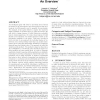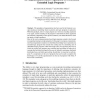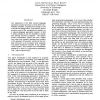111 search results - page 7 / 23 » Using Counterfactuals in Knowledge-Based Programming |
118
Voted
PODS
2006
ACM
16 years 2 months ago
2006
ACM
An intelligent agent will often be uncertain about various properties of its environment, and when acting in that environment it will frequently need to quantify its uncertainty. ...
143
Voted
CLIMA
2006
15 years 3 months ago
2006
Abstract. The paradigm of argumentation has been used in the literature to assign meaning to knowledge bases in general, and logic programs in particular. With this paradigm, rules...
IJCAI
1993
15 years 3 months ago
1993
Our experience in the IDAS natural language generation project has shown us that IDAS'S KLONE-like classifier, originally built solely to hold a domain knowledge base, could ...
128
Voted
TACAS
2004
Springer
15 years 7 months ago
2004
Springer
Abstract In the event that a system does not satisfy a specification, a model checker will typically automatically produce a counterexample trace that shows a particular instance ...
135
click to vote
IJCAI
2007
15 years 3 months ago
2007
Integrating description logics (DL) and logic programming (LP) would produce a very powerful and useful formalism. However, DLs and LP are based on quite different principles, so ...



